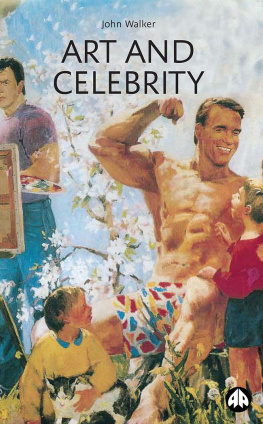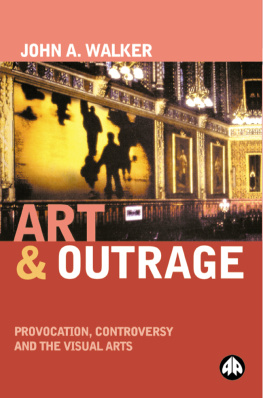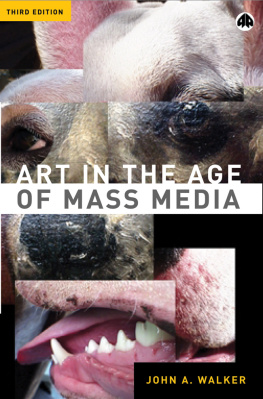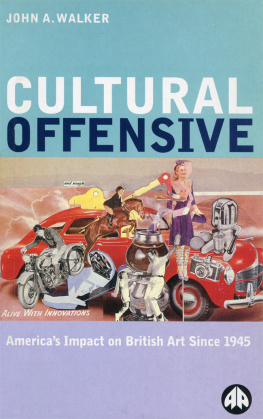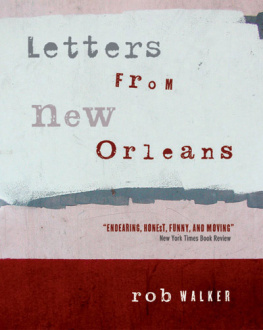Art and Celebrity
Frontispiece: Vladimir Dubosarsky & Alexander Vinogradov, En Plein Air (detail), (1995).
Painting, oil on canvas, 240 240 cm, reproduced courtesy of the artists and Vilma Gold Gallery, London.
Art and Celebrity
John A. Walker
First published 2003 by Pluto Press
345 Archway Road, London N6 5AA
and 22883 Quicksilver Drive,
Sterling, VA 201662012, USA
www.plutobooks.com
Copyright John A. Walker 2003
The right of John A. Walker to be identified as the author of this work has been asserted by him in accordance with the Copyright, Designs and Patents Act 1988.
British Library Cataloguing in Publication Data
A catalogue record for this book is available from the British Library
ISBN 0 7453 1850 9 hardback
ISBN 0 7453 1849 5 paperback
ISBN 978 1 7837 1889 4 ePub
ISBN 978 1 7837 1890 0 Kindle
Library of Congress Cataloging in Publication Data
Applied for
10 9 8 7 6 5 4 3 2 1
Designed and produced for Pluto Press by
Chase Publishing Services, Fortescue, Sidmouth EX10 9QG
Typeset from disk by Stanford DTP Services, Towcester
Printed in the European Union by
TJ International Ltd, Padstow, Cornwall, England
Contents
Acknowledgements
My thanks to Derek Manley and Rob Orman for assistance in obtaining research materials and to Mike Hazzledine for references supplied and comments on early drafts of the book. I am also grateful for information and comments to Gen Doy, Katy Deepwell, Rita Hatton, Dr Jan-Christopher Horak (curator of the Hollywood Entertainment Museum), Professor Brandon Taylor, Sharon Hayes of Bedford Borough Council, Helen Wylie of Tate Liverpool, Sue Watling, Renee Coppola of the Broad Art Foundation (Santa Monica), Michael Marek (public relations officer of the Crazy Horse organisation), Danielle Rice of the Philadelphia Museum of Art.
Thanks are also due to all the artists, galleries and photographers who have supplied me with information and images, and given permission for the latter to be reproduced: the Andy Warhol Museum in Pittsburgh, Anthony Reynolds Gallery, Clive Barker, Mary Barone, Gerard Basquiat/Estate of Jean-Michel Basquiat, Stephen Bates of the Catto Gallery (London), Sandow Birk, David Bowie, Michael J. Browne, Roderick Coyne, Eugene Doyen, Andr Durand and the Camera Press Agency, Matt Faber of Associated Press, the Fogg Art Museum, Chris Glass, Timothy Greenfield-Sanders, Greenwich Public Libraries, Alexander Guy, Maggi Hambling, Susan Hiller, Peter Howson, Wendy Hurlock of the Archives of American Art, Alison Jackson, John Keane, Karen Kilimnik, Scott King, Jeff Koons, Richard Krause, Sebastian Krger and Edition Crocodile, Johnnie Shand Kydd, Hugh MacLeod, Andrew Macpherson, David McCall of PA Photos, Sir Paul McCartney, Kerry Millett of Mother, Yasumasa Morimura and Natsuko Odate of Yoshiko Isshiki Office (Tokyo), Gerald Ogilvie-Laing, Julian Opie, Elizabeth Peyton, Grant Rusk of the Los Angeles County Museum of Art, the Sadie Coles HQ, Sebastio Salgado, A. Thomas and Cynthia Schomberg, Martin Sharp, Joanne Stephens, Celia Sterne of the Photographic Library of English Heritage, Gavin Turk and the Jay Jopling/White Cube Gallery, Winnie Tyrrell of Glasgow Museums Photolibrary, Gerrie van Noord of the Artangel Trust, Jessica Voorsanger, Ian Walters and Tim Wilcox of Manchester Art Gallery.
While every effort has been made to trace the copyright holders of art works and photographs, the publishers would be glad to hear from anyone who should have been credited so that corrections can be made in any future editions.
Introduction
Celebrity is the main currency of our economy, the prime value in our news and the main impetus in our charitable works. It is the predominant means of giving and receiving ideas, information and entertainment. Nothing moves in our universe without the imprint of celebrity.
In the past 30 years, the interpenetration of the domains of art and celebrityhood has had a significant impact on the image-making strategies of the media industry. The mutual influences have been so great that sometimes it is hard to distinguish art from advertisement.
the incremental celebritization of the contemporary artist has been fuelled by big sales and a buoyant market, which helps, but it is not the whole picture New Fame is achieved via headlining, instantly recognizable work, sexy galleries, high profile events, media ease and an extraordinary cross-fertilization into other arenas. Top of the Pops. Advertising. Food. Fashion. Film. Brands. Not since David Hockney painted the fashion guru Ossie Clark have artists fused their traditional world of private creativity with such a popular market of commerce and publicity.
While Ziauddin Sardars claims see quotation one above about celebrity, which are shared by a number of commentators, are somewhat exaggerated, there is no denying its considerable importance in contemporary developed societies. This book will argue that artists are imbricated in the culture of celebrity because they contribute images, statues, monuments and simulated relics to it, because some artists impersonate celebrities, and because others participate in its social rituals and enjoy the status of celebrities (they will be called art stars). The kind of art the latter produce is often influenced by their desire for fame and fortune. At the same time, other artists seek to criticise or deconstruct or play with celebrity or to find alternatives to the depiction of celebrities. In addition, some celebrities outside the world of art collect art while others are spare-time artists (they will be called celebrity-artists).
Furthermore, the sociologist Chris Rojek has argued that, since the eighteenth century, the growth of celebrity culture has been closely bound up with the aestheticisation of everyday life, that taste is pivotal in celebrity culture and that groupings of fans can be regarded as taste cultures.
The history of fame has been described in detail by Leo Braudy in his book The Frenzy of Renown (1986), and the main characteristics of celebrity and how is it constructed or manufactured have been analysed by sociologists, journalists and historians of the mass media and entertainment industries (see Bibliography). Theorists have also discussed the various social functions such as social integration celebrity culture is thought to perform and its paradoxical relationship to democracy. While it will not be possible to repeat all their findings, a summary of the celebrity system that emerged during the twentieth century is in order:
1) | Psychological desires, social needs and economic demands for celebrities. |
2) | A pool of celebrities, exhibitionists and wannabes eager to fulfil those demands no matter what the personal cost. |
3) | Support agencies and marketing companies ready to promote aspirants and to organise events for their public appearance so that they attain high visibility. |
4) | A range of cultural industries, such as film and sport, which employs celebrities. |
5) | A spectrum of mass media willing to discuss, glorify or denigrate them. |



